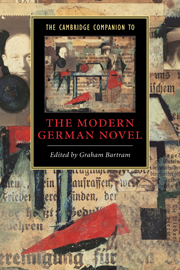Book contents
- Frontmatter
- 1 The German novel in the long twentieth century
- 2 Contexts of the novel
- 3 The novel in Wilhelmine Germany
- 4 Gender anxiety and the shaping of the self in some modernist writers
- 5 Franz Kafka
- 6 Modernism and the Bildungsroman
- 7 Apocalypse and utopia in the Austrian novel of the 1930s
- 8 Images of the city
- 9 Women writers in the ‘Golden’ Twenties
- 10 The First World War and its aftermath in the German novel
- 11 The German novel during the Third Reich
- 12 History, memory, fiction after the Second World War
- 13 Aesthetics and resistance
- 14 The kleiner Mann and modern times
- 15 The ‘critical’ novel in the GDR
- 16 Identity and authenticity in Swiss and Austrian novels of the postwar era
- 17 Subjectivity and women’s writing of the 1970s and early 1980s
- 18 The postmodern German novel
- Index
- Series List
11 - The German novel during the Third Reich
Published online by Cambridge University Press: 28 May 2006
- Frontmatter
- 1 The German novel in the long twentieth century
- 2 Contexts of the novel
- 3 The novel in Wilhelmine Germany
- 4 Gender anxiety and the shaping of the self in some modernist writers
- 5 Franz Kafka
- 6 Modernism and the Bildungsroman
- 7 Apocalypse and utopia in the Austrian novel of the 1930s
- 8 Images of the city
- 9 Women writers in the ‘Golden’ Twenties
- 10 The First World War and its aftermath in the German novel
- 11 The German novel during the Third Reich
- 12 History, memory, fiction after the Second World War
- 13 Aesthetics and resistance
- 14 The kleiner Mann and modern times
- 15 The ‘critical’ novel in the GDR
- 16 Identity and authenticity in Swiss and Austrian novels of the postwar era
- 17 Subjectivity and women’s writing of the 1970s and early 1980s
- 18 The postmodern German novel
- Index
- Series List
Summary
The novels discussed in this chapter all adopt a critical stance, though from widely different points of view, towards the period of National Socialist rule in Germany. Most, of necessity, were written outside the country, but one was written and, surprisingly, published inside the Third Reich. This selection is based not merely on political preference but on the quality of writing, for, as far as I am aware, no pro-Nazi novel of any literary merit exists.
National Socialism mainly had itself to blame for the lack of readable novels sympathetic to the cause, for the anti-critical mind-set of Nazism was inherently hostile to the spirit of free, often irreverent and disturbing inquiry that has inspired novels of any literary ambition from the mid sixteenthcentury Lazarillo de Tormes onwards. The novel became one of the preeminent modes of engaging imaginatively with the modern world precisely because it dealt with things which the ideology of the National Socialists (if not their practice) abhorred as decadent, corrupting and debasing: the city, social conflict, sexuality, the role of the subconscious, or the relation of disease or weakness to creativity. Goebbels’s desire to see the diet of historical and ‘blood and soil’ fiction varied by novels of contemporary, urban reality in the new Germany was bound to be disappointed, not simply because of the discrepancy between Nazi wish-dreams and observable reality, but because the ‘cultural–political’ practices of the Nazis – the public book-burnings in May 1933 by students at universities up and down the country, the ‘black lists’ of forbidden and undesirable literature, the control of the means of literary production – had resulted in the immediate and continuing exodus from Germany of the great majority of talented writers from 1933 onwards. Those who stayed had extreme difficulty in expressing themselves freely and critically.
- Type
- Chapter
- Information
- The Cambridge Companion to the Modern German Novel , pp. 152 - 166Publisher: Cambridge University PressPrint publication year: 2004



